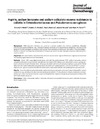Identificador persistente para citar o vincular este elemento:
https://accedacris.ulpgc.es/jspui/handle/10553/75840
| Título: | Aspirin, sodium benzoate and sodium salicylate reverse resistance to colistin in Enterobacteriaceae and Pseudomonas aeruginosa | Autores/as: | Malla, Cristina F. Mireles, Natalia A. Ramírez Corbera, Ana Sofía Poveda Guerrero, José Bismarck Tavío Pérez, María Del Mar |
Clasificación UNESCO: | 32 Ciencias médicas 3209 Farmacología 3207 Patología |
Palabras clave: | Aspirin Pseudomonas aeruginosa Colistin Enterobacteriaceae Sodium benzoate |
Fecha de publicación: | 2020 | Publicación seriada: | Journal of Antimicrobial Chemotherapy | Resumen: | BACKGROUND: MDR bacterial infections are currently a serious problem for clinicians worldwide. Klebsiella pneumoniae and Enterobacter spp., among Enterobacteriaceae, and Pseudomonas aeruginosa, are part of the group of ESCAPE pathogens or bacteria that 'escape' from common antibacterial treatments. The lack of effectiveness of the first common line of antibiotics has led to the search for new therapies based on older antibiotics, such as colistin. OBJECTIVES: We searched for new enhancers of the action of colistin against MDR Gram-negative bacteria that can be easily applicable to clinical treatments. METHODS: Colistin MICs were determined alone and with the protonophores CCCP, sodium benzoate, sodium salicylate and aspirin using the broth microdilution method and FIC indexes were calculated to assess synergy between colistin and each chemical. Time-kill assays of colistin with and without protonophores were performed to determine the bactericidal action of combinations of colistin with protonophores. Likewise, the effect of sucrose, l-arginine and l-glutamic acid on the MICs of colistin alone and combined with each protonophore was assessed. RESULTS: It was found that sodium benzoate, sodium salicylate and aspirin, at concentrations allowed for human and animal use, partially or totally reversed resistance to colistin in P. aeruginosa and highly resistant enterobacterial strains. The mechanism of action could be related to their negative charge at a physiological pH along with their lipid-soluble character. CONCLUSIONS: Sodium benzoate, sodium salicylate and aspirin are good enhancers to use in antibiotic therapies that include colistin. | URI: | https://accedacris.ulpgc.es/handle/10553/75840 | ISSN: | 1460-2091 | DOI: | 10.1093/jac/dkaa371 | Fuente: | Journal of antimicrobial chemotherapy [1460-2091], v. 75 (12), p. 3568-3575, (Diciembre 2020) |
| Colección: | Artículos |
Citas SCOPUSTM
11
actualizado el 08-jun-2025
Citas de WEB OF SCIENCETM
Citations
13
actualizado el 12-ene-2026
Visitas
111
actualizado el 10-ene-2026
Descargas
272
actualizado el 10-ene-2026
Google ScholarTM
Verifica
Altmetric
Comparte
Exporta metadatos
Los elementos en ULPGC accedaCRIS están protegidos por derechos de autor con todos los derechos reservados, a menos que se indique lo contrario.
